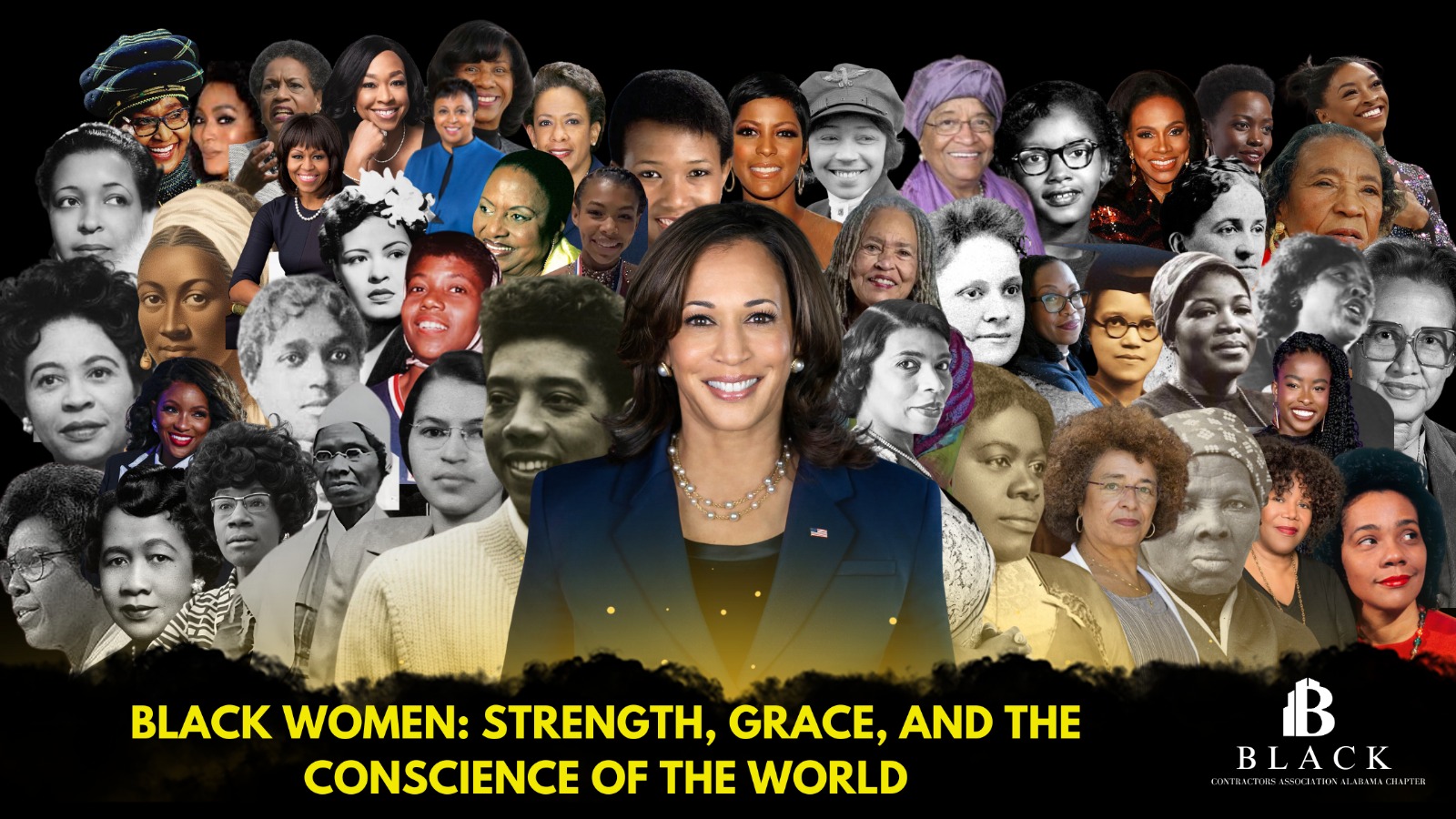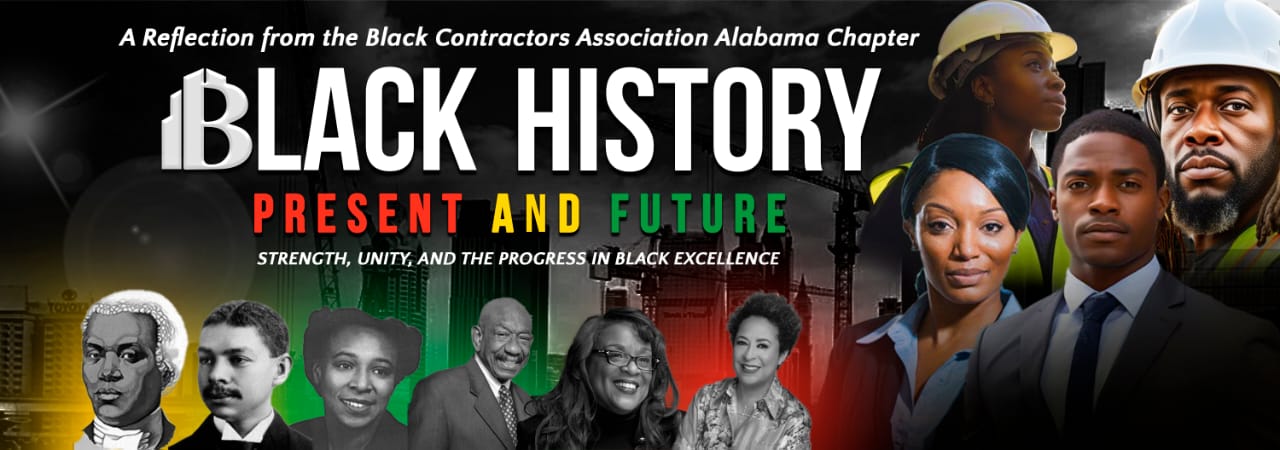By Bill Day
Introduction:
In a reflective interview, Bill Day speaks with Jarrod Sims, President of the Black Contractors Association Alabama Chapter (BCAAC). They explore the profound legacy of Black women throughout history, the inequities Black women still face in society today, and the unique challenges and resilience they bring to every field they enter, including construction. This conversation honors the strength, fortitude, and unwavering presence of Black women in our communities, recognizing figures past and present who have shaped our world.
Q&A Session
Bill Day: Jarrod, as we reflect on the recent presidential race and the incredible effort of Kamala Harris, many of us hoped to see her become the first Black woman president. What does her journey and the outcome of this race mean to you personally, and what message does it send?
Jarrod Sims: I had high hopes for Kamala. She is intelligent, deeply prepared, and ran a campaign that resonated with the spirit and strength of Black women worldwide. Her commitment showed that readiness, knowledge, and ethics should be cornerstones for any leader. Sadly, the race outcome highlights a persistent double standard in America—one that disproportionately impacts Black women.
If a Black woman showed even a fraction of the lack of preparation or integrity that we see allowed in white male candidates, she would be dismissed immediately. Kamala’s journey is a testament that Black women, no matter how qualified, are forced to work harder to be seen, heard, and considered. Despite these inequities, she has been a pillar, inspiring young Black women to dream and pursue leadership, showing that our worth and contributions cannot be overshadowed. She has reminded us that dignity, courage, and persistence are traits that can’t be taken from us.
Bill Day: Black women have indeed demonstrated remarkable resilience. We can think back to figures like Harriet Tubman, Sojourner Truth, Shirley Chisholm, Coretta Scott King, and even Winnie Mandela. What do you think about the legacy they’ve built, especially for Black women today?
Jarrod Sims: These women were—and still are—the conscience of the world. Harriet Tubman risked her life countless times to free others, embodying sacrifice and courage that most could only dream of. Shirley Chisholm didn’t just break glass ceilings; she shattered stereotypes and prejudices by being the first Black woman elected to Congress. Coretta Scott King and Betty Shabazz, whose husbands were murdered for trying to secure liberty and justice, both carried forward their legacies through actions that reshaped social justice.
The legacy these women created wasn’t built on convenience or privilege; it was built on perseverance. They worked to hold society accountable, to shine a light on injustices, and to guide us toward a more just world. Black women today stand on these monumental shoulders, continuing this work in every field. Yet, as these leaders fought against racial and gender-based limitations, today’s Black women still face obstacles unique to them. They inherit both the struggle and the strength of these legendary women.
Bill Day: Let’s talk about inequities. America still sees deeply rooted disparities in healthcare, especially in maternal health, where Black women face higher mortality rates in childbirth. Why do you think these issues persist, and what can we do to address them?
Jarrod Sims: The disparities in maternal health reflect a broader problem of systemic neglect. Black women face maternal mortality rates three to four times higher than their white counterparts, and it’s not due to genetic or personal factors; it’s because of entrenched racism within our healthcare system. Black women aren’t given the same attention, care, or respect. This is about unconscious bias and, frankly, a disregard for Black lives.
Addressing these issues requires systemic changes—training healthcare providers to recognize their biases, increasing representation in healthcare, and ensuring that Black women are taken seriously. But more importantly, it requires America to value Black women, recognizing that they are not only deserving of care but essential to the fabric of this nation.
Bill Day: There are parallels here to the construction industry, where Black contractors face numerous barriers. How do you see this privilege and access playing out within construction?
Jarrod Sims: The construction industry has long operated on a system of exclusion, where Black contractors and companies have to overcome endless obstacles just to be considered for opportunities readily available to their white counterparts. Access to capital, discriminatory hiring practices, and exclusion from major projects are common barriers. Meanwhile, our Black contractors are held to stricter standards, often being forced to prove their qualifications repeatedly.
The privilege and access afforded to some, simply due to their race, is the same privilege that blocks Black men and women in construction. But we continue to fight for our rightful place, knowing that we have the skills, dedication, and legacy of those who came before us. This fight isn’t just about getting a contract; it’s about creating an equitable industry where Black excellence is recognized and rewarded.
Bill Day: Many people might not see Black women’s contributions in fields like construction, yet they are essential there as well. What role do you see Black women playing in this industry, and what message do you have for them?
Jarrod Sims: Black women in construction are groundbreaking figures. They’re not just laborers or administrators; they’re innovators, designers, and leaders. The strength they bring to this industry is unparalleled, and often, they work without the same support networks or mentorship afforded to others. Yet they persist, driven by a vision to build, inspire, and pave a path for future generations.
To every Black woman in this field, whether you own a construction company, provide professional services, or are a laborer on the ground, know that you are seen. Your resilience, dedication, and innovation are reshaping this industry. The Black Contractors Association, Alabama Chapter, stands with you, supporting your growth and pushing for systemic change so that Black women, just like anyone else, can thrive.
Bill Day: Let’s return to the theme of Black women as the world’s conscience. We saw that Black women overwhelmingly supported Kamala Harris. What does this say about the spirit of Black women in America?
Jarrod Sims: Black women have always been the backbone of movements in America. When others lose faith or abandon the cause, Black women stand firm. Their support for Kamala wasn’t just about a candidate; it was about a shared vision for a more just and compassionate America. This spirit is rooted in resilience and loyalty to a larger cause—the cause of justice, equality, and opportunity for all.
While others may falter or prioritize personal gain, Black women have always shown up for the community. This spirit of unwavering support, coupled with grace and an unwavering sense of justice, is the conscience of the world. They remind us of what’s truly at stake and hold us all accountable.
Closing Statement:
To the Black women in construction and every Black woman shaping industries across the country, this message is for you. You are the strength, grace, and conscience of not just this nation but the world. Your contributions, often unrecognized, are invaluable. As President of the Black Contractors Association Alabama Chapter, I want you to know that we are here, advocating for your success, your inclusion, and your right to thrive in any field you choose.
Keep leading, keep building, and know that your resilience is an inspiration. You are not alone in this journey, and together, we are forging a future where equality is not a dream but a reality. We honor you, stand with you, and will continue to champion your legacy. Thank you for everything you do, seen and unseen, to shape our world.





